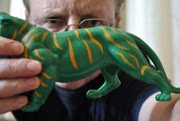Yesterday I paid a quick visit to Dorchester, which like most English towns has been adversely affected by the credit crunch. The town has always had a sizable proportion of independent shops, some of which closed down in the recession. However, more than 20 new businesses and shops have moved into the county town in the last year. I bought a tasty leek and cheese lattice thing from the newly opened Joshua’s, a ‘wholesome natural food’ shop.
In 2004, Dorchester appeared in the Top 10 of UK clone towns in a story that was widely reported in the UK press. ‘Clone town’ is a term for a town or city dominated by chain stores. Puzzled by this, I looked at the source of the data, a report by the New Economics Foundation (NEF). Their ‘methodology’ was a request, via their web site, that members of the public fill in a questionnaire based on a walk down their local high street. One hundred and thirty usable questionnaires were received. Southampton, clone town extraordinaire, presumably doesn’t appear anywhere in the report because no-one filled in a form.
Not exactly rigorous stuff – relying on unverified reports from random people off the Internet. The inclusion of Dorchester is obviously completely incorrect. However the top 10 was reported by the serious press as if it was authoritative research:
BBC
‘Researchers found chainstores dominated the main shopping street...’
Researchers? Not really. It was based on questionnaires sent in by members of the public.
The Independent
‘according to a report published today’
Sound quite official, doesn’t it?
The Guardian
‘It found 42 of the 103 towns it surveyed in England, Scotland and Wales...’
‘It surveyed’? Well, the NEF didn’t survey the towns itself, it just compiled the information received.
In the book Flat Earth News, journalist Nick Davies describes how much ‘news’ consists of press releases regurgitated without question by overworked journalists. At least, I think that’s what he says – in the true spirit of lazy journalism, I haven’t actually read the book or spent much time writing this blog post, to be honest.
While agreeing with the NEF’s polemic against clone towns, I think what this shows is that the media love a good list, and any old press release with a top 10 will get published without question. Meanwhile, good luck to Joshua’s and all the other new and old independent shops in Dorchester.
Subscribe to:
Post Comments (Atom)

2 comments:
On the one hand the media in the UK is excellent (Look at the US), but on the other it could be much better
I find it interesting it isn't just the usual suspects letting the team down but the broadsheets as well
BAD SCIENCE, has made it into my RSS reader, http://www.badscience.net/ which is Dr Ben Goldacres rather sobering chronicling of media lapses regarding science.
Ian Walkers blog also made it in. http://bamboobadger.blogspot.com . It focuses on poor research.
Really rather worrying, if not amusing.
Lesson learned.
Pinch of salt
Yes, I'm sure Ben Goldacre will never run short of material for his "Bad Science" articles!
Post a Comment